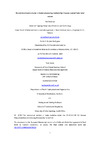Identificador persistente para citar o vincular este elemento:
https://accedacris.ulpgc.es/jspui/handle/10553/52358
| Campo DC | Valor | idioma |
|---|---|---|
| dc.contributor.author | Chun-Lai, Pei | en_US |
| dc.contributor.author | Espino-Rodríguez, Tomás F. | en_US |
| dc.contributor.author | Baum, Tom | en_US |
| dc.date.accessioned | 2018-11-25T19:38:47Z | - |
| dc.date.available | 2018-11-25T19:38:47Z | - |
| dc.date.issued | 2019 | en_US |
| dc.identifier.issn | 1354-8166 | en_US |
| dc.identifier.other | WoS | - |
| dc.identifier.uri | https://accedacris.ulpgc.es/handle/10553/52358 | - |
| dc.description.abstract | The study examines relational norms in outsourcing relationships. The study analyzes some factors that determine the use of relational norms, such as outsourcing benefits and the competitive strategy (cost leadership and differentiation). In addition, it analyzes the influence of the use of relational norms on the outsourcing success. Based on a sample of 127 outsourcing relationships in two tourist destinations, a partial least squares structural model was used to test the hypotheses. The findings show that the outsourcing benefits and competitive strategy determine the use of relational norms. They also show that there is a positive relationship between relational norms and outsourcing success. Some differences were found between the two destinations analyzed. | en_US |
| dc.language | eng | en_US |
| dc.publisher | 1354-8166 | - |
| dc.relation.ispartof | Tourism Economics | en_US |
| dc.source | Tourism Economics[ISSN 1354-8166],v. 25 (2), p. 189-212 | en_US |
| dc.subject | 531290 Economía sectorial: turismo | en_US |
| dc.title | Do relational norms matter in outsourcing relationships? Lesson learned from hotel sectors | en_US |
| dc.type | info:eu-repo/semantics/article | en_US |
| dc.type | Article | en_US |
| dc.identifier.doi | 10.1177/1354816618794553 | en_US |
| dc.identifier.scopus | 85053378220 | - |
| dc.identifier.isi | 000458865500003 | - |
| dc.contributor.authorscopusid | 57192006881 | - |
| dc.contributor.authorscopusid | 8582478200 | - |
| dc.contributor.authorscopusid | 7102086841 | - |
| dc.identifier.eissn | 2044-0375 | - |
| dc.description.lastpage | 212 | en_US |
| dc.identifier.issue | 2 | - |
| dc.description.firstpage | 189 | en_US |
| dc.relation.volume | 25 | en_US |
| dc.investigacion | Ciencias Sociales y Jurídicas | en_US |
| dc.type2 | Artículo | en_US |
| dc.contributor.daisngid | 24163337 | - |
| dc.contributor.daisngid | 1702354 | - |
| dc.contributor.daisngid | 417645 | - |
| dc.description.numberofpages | 24 | en_US |
| dc.utils.revision | Sí | en_US |
| dc.contributor.wosstandard | WOS:Chun-Lai, P | - |
| dc.contributor.wosstandard | WOS:Espino-Rodriguez, TF | - |
| dc.contributor.wosstandard | WOS:Baum, T | - |
| dc.identifier.ulpgc | Sí | en_US |
| dc.contributor.buulpgc | BU-ECO | en_US |
| dc.description.sjr | 0,611 | |
| dc.description.jcr | 1819,0 | |
| dc.description.sjrq | Q1 | |
| dc.description.jcrq | Q2 | |
| dc.description.ssci | SSCI | |
| item.fulltext | Con texto completo | - |
| item.grantfulltext | open | - |
| crisitem.author.dept | GIR IUCES: Estrategia y Negocios Internacionales | - |
| crisitem.author.dept | IU de Cibernética, Empresa y Sociedad | - |
| crisitem.author.dept | Departamento de Economía y Dirección de Empresas | - |
| crisitem.author.orcid | 0000-0002-4292-504X | - |
| crisitem.author.parentorg | IU de Cibernética, Empresa y Sociedad | - |
| crisitem.author.fullName | Espino Rodríguez, Tomás Francisco | - |
| Colección: | Artículos | |
Citas SCOPUSTM
8
actualizado el 08-jun-2025
Citas de WEB OF SCIENCETM
Citations
7
actualizado el 18-ene-2026
Visitas
53
actualizado el 11-ene-2026
Google ScholarTM
Verifica
Altmetric
Comparte
Exporta metadatos
Los elementos en ULPGC accedaCRIS están protegidos por derechos de autor con todos los derechos reservados, a menos que se indique lo contrario.
